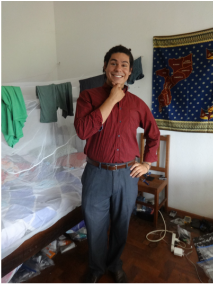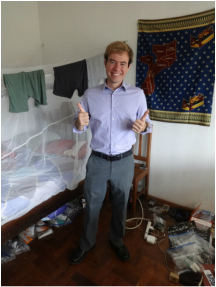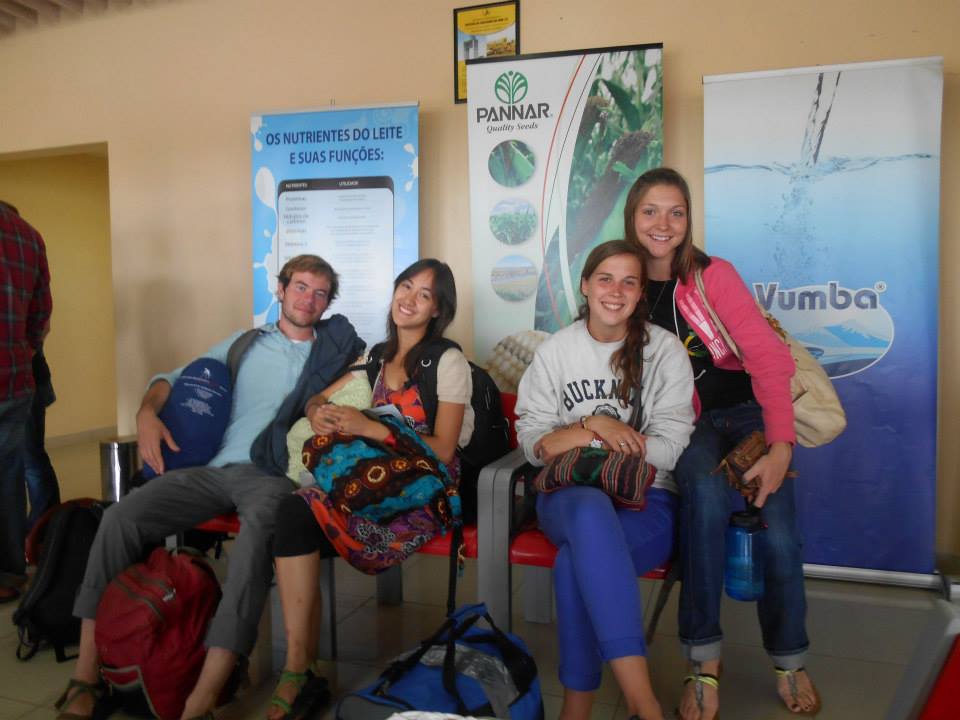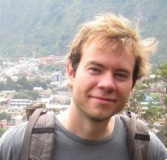As my sister Katie says, I've been quiet lately--on my blog and otherwise--which means I've been busy. She's right, of course; since my arrival in Chimoio in December I've been putting my living space together, figuring out a routine for persisting on about $200 US a month (plenty really), learning my way around the city, meeting as many Mozambicans as possible and trying to keep all their names straight in my head (Pedro/Pida/Paulo/Ana Paula? Ofelio/Augosto/António/Ajape/Osvaldo?), meeting ex-pats, traveling for Christmas, hosting other PCVs for New Year's, and by far the most time-consuming thing: hitting the ground running hard on work at the university. More on that later.
But Katie's only partially right. My silence on my blog can be attributed not just to the fact that I've been busy, but also to the fact that I don't know where to begin to describe Chimoio and what being here is like. Anyone who's lived abroad and tried to catalog the experience knows how quickly the chasm between what-it's-all-like and what-can-be-captured-in-writing grows. It can be discouraging. It calls to mind something Robert Pirsig wrote in his devastatingly insightful Zen and the Art of Motorcycle Maintenance, the protagonist coaching his son on writing a letter to his mom: "You’re trying to think of what to say and what to say first at the same time and that’s too hard." Totally. There's so much I could write about--my house and home life, the university and work life, the market, the supermarket, what walking down the street is like, greeting people, language, seeing poverty, seeing wealth, PCV culture, Mozambican culture, hiking, weather, nearby PCVs and their sites, hardest and easiest parts, bugs and spiders, health and sickness, money, ... the list goes on. Where to begin?
But then I remember that I have a whole two years to try to capture it. I think I need to follow Pirsig's advice and start small, just someplace, anyplace. My arrival.
My Arrival
The morning following an evening of tough goodbyes to the Moz-21 PCVs destined for other distant parts of the country, the other "Central Region" PCVs and I hopped a plane for Chimoio. As we came down out of the clouds we were treated to our first glimpse of the beautiful and startlingly different topography we would inhabit for two years. Expanses of brooding mountains interspersed with expanses of desolate plains. (Perhaps it was just the cloudiness of that day that calls those particular adjectives to mind.) In some places there would be a mountain peak jutting out of an expanse of plain, just sort of in the middle of nowhere. I liked it. I think we all began to get really excited at that point in the descent. How could you not? One of my favorite things is that the landscape is not quite like any other place I've been, which means someday I'll have all sorts of strong emotions and nostalgia for this place wrapped up in my mind's eye view of those mountains and plains. Like I do for Cuenca, Ecuador.
Anyway, I definitely owe you a picture of the things I just described, and promise to eventually post one.
After this short flight, we arrived in Chimoio for a 3-day conference. (There always seemed to be just one more thing before we could start our 2-year service.) Here are a few of us in the Chimoio airport!:
The ruling party, FRELIMO, has set up a military convoy to shuttle cars across that strip en masse at regular intervals, which is your only option if you're willing to risk traveling it. If you have the money, or the backing of the most powerful country on earth like I do, you fly. I can't imagine having a situation like this in one's home country, what that'd be like. The good news for me is that it's all happening far from Chimoio, and things are pretty safe around here. Also, I've heard that very recently, the leadership of both FRELIMO and RENAMO in Maputo agreed to sit down for talks that would include some international observers. Hopefully things have taken a turn for the better. If you're interested, you should really read up on the whole affair. Like any political-military conflict, it's more complicated than a surface-level description can convey, and this one has roots going at least as far back as the civil war.
But let's return to the topic of Chimoio. After three days of more US-Mozambique cultural limbo at the Castelo Branco hotel, a crazy place with hot showers, air conditioning, conference rooms, and food buffets, we PCVs of the Central Region finally said our own goodbyes and headed off to our various sites in the provinces of Manica (cool weather and pretty mountains) and Tete (miserably hot). These goodbyes were probably less difficult than the Maputo ones; a lot of us were able to reunite just weeks later over the holidays.
My House
Finally it was time for my permanent site! The rest of the central crew got into cars and chapas and braced for trips of anywhere from 30 minutes to 8 hours to places with names like Vanduzi, Dombe, Zóbwè... Steven and I, on the other hand, just moved our stuff down the street. We were effectively already at our site. Meet Steven now, of previous blog post fame, my roommate and colleague for the next two years:


You do see some t-shirts and shorts around here in Chimoio, but mostly it's children and young people wearing that kind of thing. And laborers do wear pretty scruffy-looking clothes when on the job. But mostly, you see men wearing polos and collared shirts, even those of modest means.
Now, without question more severe poverty exists as well, and I don't want to minimize that. There are folks without the resources to get their hands on clothes and especially shoes, and you do see that kind of thing. Often it is the children who end up running around wearing nothing but dirty rags. I am still new here and there is a lot I haven't seen, so I hope the perspective I'm sharing here isn't too distorted or one-sided. I guess my only point in all of this is that culturally, appearance and dress are prioritized in Mozambique more than someone from a U.S. perspective might expect.
Getting back to that move-in day back in December--they took us and our luggage down the block from the hotel to what would be our house for the next two years, dropped us off, and then we were on our own. We were happy to finally be so. The house is really a fantastic place to live. Everything I wrote about it previously is true; it has running water and electricity most of the time, and it has amazing fruit trees out back. The house is a huge comfort to come home to every day, and I'm grateful for it. It's gotta be among the fanciest places Mozambican Peace Corps volunteers get to live. I'll close this post with some photos of the house and a promise to post about work and the university next time. Até a próxima! Obrigado por ler! Be well.



 RSS Feed
RSS Feed